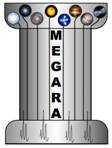Dept. Astrofísica y CC de la Atmósfera Univ. Complutense de Madrid
| Research lines:
Local star-forming galaxies Galaxy models Surveys Databases SHARDS project Stellar libraries Early-type galaxies Meteors and Fireballs Dark Skies |
Instrumental developments: MEGARA:Multi-Espectrógrafo en GTC de Alta Resolución para Astronomía |  |
| EMIR: Espectrógrafo Multiobjeto en el InfraRrojo |

| |
| FRIDA: inFrared Imager and Dissector for Adaptative optics |
 |
AEGIS astronomers seminars
Los prof. Giovanni G. Fazio (Harvard-Smithsonian Center for Astrophysics), Jiasheng Huang (Smithsonian Astrophysical Observatory, SAO), prof. David C. Koo (U. California Observatories/Lick Observatory) y Eiichi Egami (Dept. of Astronomy and Steward Observatory, University of Arizona) están de visita en la UCM tras la reunión del grupo AEGIS en Toledo. Más fotos en la galería de imágenes
AEGIS astronomers visit Universidad Complutense Library
From 2009_12_14_BUCM |
Sentado: Giovanni G. Fazio (frente al códice original). De pie, de izq. a der.: Jesús Gallego, Jiasheng Huang, David C. Koo, Pablo G. Pérez-González, Eiichi Egami, Jaime Zamorano (mostrando la edición facsímil). |
Master thesis research works presented
III Consolider-GTC Meeting in Cádiz
From 20th to 23rd of October 2009, the III Consolider-GTC meeting was held in the thousand-year-old city of Cádiz. Nearly 100 project members assisted the encounter in the Hotel Atlántico - Parador de Cádiz. The meeting, funded by the CONSOLIDER INGENIO-2010 program of the MICINN, allowed the project members to expose and discuss the proposals and projects related to the scientific exploitation of the Spanish 10m telescope GTC, as well as to enable collaborations between different research groups inside the project. More information here.
UCLAN Conference "Hunting for the Dark: The Hidden Side of Galaxy Formation"

 GUAIX member Carmen Eliche has attended to the conference held in Malta from October 19th-21st, 2009. Nearly 200 astrophysicists have confered, discussed, and transfered their knowledge on faint, dust-obscured, or dark components of galaxies during this week. The state-of-the-art cosmological simulations on galaxy formation were shown by their developers, as well as different, exotic theories on AGN radio modes or on binary super massive black holes that are coalescencing. Even the doubts of certain scientists on the existence of dark matter (thought to represent more than 90% of the total matter in the Universe) appeared during the discussion sessions. We presented a poster on numerical simulations, proving that some inner disks and rings in galaxies could have been formed through minor mergers. For a low-resolution version of the poster, click here.
GUAIX member Carmen Eliche has attended to the conference held in Malta from October 19th-21st, 2009. Nearly 200 astrophysicists have confered, discussed, and transfered their knowledge on faint, dust-obscured, or dark components of galaxies during this week. The state-of-the-art cosmological simulations on galaxy formation were shown by their developers, as well as different, exotic theories on AGN radio modes or on binary super massive black holes that are coalescencing. Even the doubts of certain scientists on the existence of dark matter (thought to represent more than 90% of the total matter in the Universe) appeared during the discussion sessions. We presented a poster on numerical simulations, proving that some inner disks and rings in galaxies could have been formed through minor mergers. For a low-resolution version of the poster, click here.











